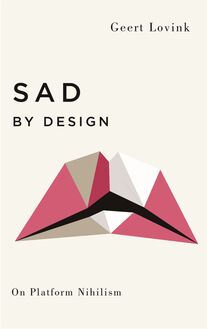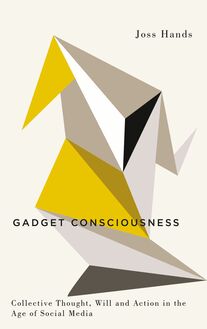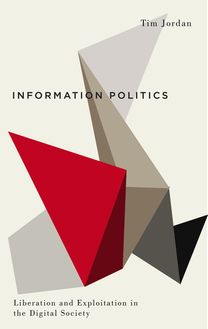-
 Univers
Univers
-
 Ebooks
Ebooks
-
 Livres audio
Livres audio
-
 Presse
Presse
-
 Podcasts
Podcasts
-
 BD
BD
-
 Documents
Documents
-
- Cours
- Révisions
- Ressources pédagogiques
- Sciences de l’éducation
- Manuels scolaires
- Langues
- Travaux de classe
- Annales de BEP
- Etudes supérieures
- Maternelle et primaire
- Fiches de lecture
- Orientation scolaire
- Méthodologie
- Corrigés de devoir
- Annales d’examens et concours
- Annales du bac
- Annales du brevet
- Rapports de stage
La lecture à portée de main
Vous pourrez modifier la taille du texte de cet ouvrage
Découvre YouScribe en t'inscrivant gratuitement
Je m'inscrisDécouvre YouScribe en t'inscrivant gratuitement
Je m'inscrisEn savoir plus
Vous pourrez modifier la taille du texte de cet ouvrage
En savoir plus

Description
We are in the middle of a 'desirevolution' - a fundamental and political transformation of the way we desire as human beings. Perhaps as always, new technologies - with their associated and inherited political biases - are organising and mapping the future. What we don’t seem to notice is that the primary way in which our lives are being transformed is through the manipulation and control of desire itself.
Our very impulses, drives and urges are 'gamified' to suit particular economic and political agendas, changing the way we relate to everything from lovers and friends to food and politicians. Digital technologies are transforming the subject at the deepest level of desire – re-mapping its libidinal economy - in ways never before imagined possible.
From sexbots to smart condoms, fitbits to VR simulators and AI to dating algorithms, the 'love industries' are at the heart of the future smart city and the social fabric of everyday life. This book considers these emergent technologies and what they mean for the future of love, desire, work and capitalism.
Introduction: The Grindr Saga
1. Data Love
2. The Digital Libidinal City
3. Simulation and Stimulation: from Games to Porn
4. The Match: Metaphor vs Metonymy
Conclusion: Ready Worker One
Sujets
Informations
| Publié par | Pluto Press |
| Date de parution | 20 mai 2022 |
| Nombre de lectures | 0 |
| EAN13 | 9780745344898 |
| Langue | English |
Informations légales : prix de location à la page 0,1148€. Cette information est donnée uniquement à titre indicatif conformément à la législation en vigueur.
Extrait
Dream Lovers
If you want a glimpse into how our desires are manufactured under our new techno-feudal order, and how love can prove our last defence, read Alfie Bown s Dream Lovers .
-Yanis Varoufakis
Alfie Bown is one of the smartest writers around. Dream Lovers is an exciting, astute analysis of how our capacity for desire and reverie has been slotted into the grooves of digital capitalism, and made to work for profit - from porn to Pok mon.
-Richard Seymour, author of The Twittering Machine
A brisk and engaging examination of the gamification of love, a sharp analysis of contemporary technopolitics and of the synthetic quality of desire.
-Helen Hester, Professor of Gender, Technology and Cultural Politics, University of West London, and co-author of After Work: The Fight for Free Time
Informative, entertaining and devastating all at once. Extremely well-argued and persuasive, it clearly shows how the technologies that promise to help us find love, or even just sex, are also perfectly designed to exploit us at our most vulnerable.
-Anouchka Grose, writer and psychoanalyst, Centre for Freudian Analysis and Research
Digital Barricades: Interventions in Digital Culture and Politics
Series editors: Professor Jodi Dean, Hobart and William Smith Colleges Dr Joss Hands, Newcastle University Professor Tim Jordan, University College London
Also available:
Furious: Technological Feminism and Digital Futures Caroline Bassett, Sarah Kember and Kate O Riordan
Gadget Consciousness: Collective Thought, Will and Action in the Age of Social Media Joss Hands
Shooting a Revolution: Visual Media and Warfare in Syria Donatella Della Ratta
Information Politics: Liberation and Exploitation in the Digital Society Tim Jordan
Inhuman Power: Artificial Intelligence and the Future of Capitalism Nick Dyer-Witheford, Atle Mikkola Kjosen and James Steinhoff
Fashioning China: Precarious Creativity and Women Designers in Shanzhai Culture Sara Liao
Cyber-Proletariat: Global Labour in the Digital Vortex Nick Dyer-Witheford
Sad by Design: On Platform Nihilism Geert Lovink
The Digital Party: Political Organisation and Online Democracy Paolo Gerbaudo
Unreal Objects: Digital Materialities, Technoscientific Projects and Political Realities Kate O Riordan
Dream Lovers
The Gamification of Relationships
Alfie Bown
First published 2022 by Pluto Press
New Wing, Somerset House, Strand, London WC2R 1LA
www.plutobooks.com
Copyright Alfie Bown 2022
The right of Alfie Bown to be identified as the author of this work has been asserted in accordance with the Copyright, Designs and Patents Act 1988.
British Library Cataloguing in Publication Data
A catalogue record for this book is available from the British Library
ISBN 978 0 7453 4488 1 Hardback
ISBN 978 0 7453 4487 4 Paperback
ISBN 978 0 7453 4491 1 PDF
ISBN 978 0 7453 4489 8 EPUB
This book is printed on paper suitable for recycling and made from fully managed and sustained forest sources. Logging, pulping and manufacturing processes are expected to conform to the environmental standards of the country of origin.
Typeset by Stanford DTP Services, Northampton, England
Simultaneously printed in the United Kingdom and United States of America
Contents
Series Preface
Introduction: The Grindr Saga
1. Data Love
2. The Digital Libidinal City
3. Simulation and Stimulation: From Games to Porn
4. The Match: Metaphor vs Metonymy
Conclusion: Ready Worker One
Notes
Index
Series Preface
Crisis and conflict open up opportunities for liberation. In the early twenty-first century, these moments are marked by struggles enacted over and across the boundaries of the virtual, the digital, the actual, and the real. Digital cultures and politics connect people even as they simultaneously place them under surveillance and allow their lives to be mined for advertising. This series aims to intervene in such cultural and political conjunctures. It features critical explorations of the new terrains and practices of resistance, producing critical and informed explorations of the possibilities for revolt and liberation.
Emerging research on digital cultures and politics investigates the effects of the widespread digitisation of increasing numbers of cultural objects, the new channels of communication swirling around us and the changing means of producing, remixing and distributing digital objects. This research tends to oscillate between agendas of hope, that make remarkable claims for increased participation, and agendas of fear, that assume expanded repression and commodification. To avoid the opposites of hope and fear, the books in this series aggregate around the idea of the barricade. As sources of enclosure as well as defences for liberated space, barricades are erected where struggles are fierce and the stakes are high. They are necessarily partisan divides, different politicizations and deployments of a common surface. In this sense, new media objects, their networked circuits and settings, as well as their material, informational, and biological carriers all act as digital barricades.
Jodi Dean, Joss Hands and Tim Jordan
Introduction: The Grindr Saga
Dreams spring from reality and are realized in it.
- Ivan Chtcheglov (1953)
Wandering into the intoxicating world of bizarre and alluring pleasures that is the Tencent App Store, the world s largest digital marketplace, you ll probably experience an initial sense of confusion. Bombarded with gauche images, garish pop art text and bold promises of riches, orgasms and other delights, it would be hard not to feel at least somewhat overwhelmed. Over time, though, you get accustomed to this dream world of hallucinogenic commodities, and you might even find a little corner of it in which you can find some relaxation, distraction - or perhaps even pleasure - of your own.
Perhaps you navigate past the invitations of scantily-clad casino hosts, specialised dating sites and personally tailored pornography (now under greater censorship there), and bypass the artificial intelligence (AI) chatbots, virtual reality (VR) relationship simulators and windows of livestreamers vying for your click and find yourself in the world of or Hope: To See You Again , an animated videogame made by one of the larger games companies in China. In that imaginary world you exist as an avatar, get attached to a Tamagotchi-like robopet and set off on the long adventure of a second virtual life, ending in your marriage to an Anime-style fembot with whom you see out your days in blissful pastoral serenity. It might all be a bit strange, but it s familiar enough when it s safely confined to the virtual world of videogames and fantasy that we have become familiar with vacationing in through our screens.
Until it isn t. Between 2016 and 2018 Beijing Kunlun Tech, the company who own Hope: To See You Again and many of the world s most popular mobile and online games completed a takeover of Grindr. Grindr, the world s largest gay dating app, had been a US-based company since its inception in 2009 and one of the few that had remained independent. Until then it had escaped the clutches of IAC, the New York holding company whose offices are housed in a glass blob worthy of science fiction that gazes across the water from Manhattan to New Jersey. Until 2020 IAC owned Match Group, the umbrella over almost all the major US dating sites, from PlentyofFish and OKCupid to Hinge and Tinder, all discussed in this book. Dating sites were grouped with each other, sharing data, algorithms, profits, and so on. Then, the love industry seemed like something of a closed circle, dominated by one conglomerate and operating according to its own logic. Now, the gap between games and love, and between simulation and reality, is closing.
The Grindr takeover embodies this trend. Of course, one significance of the takeover is the increasing globalisation of platforms, of the corporate interest in and use of their data and specifically of China s increasingly powerful role in these patterns. Access to the data that comes from dating sites is empowering. It is intimate data. In carrying out our sexual lives and our love lives at least partially and often entirely online, we create powerful data connected to our most intimate and ultimate desires. This data has great value, both as the basis for targeted advertising campaigns but also - as we shall see in this book - as the basis for a wider and more complete social reorganisation. By knowing and changing what we desire, platforms and tech companies are empowered to manufacture the future of social life, of sex and even of love. In 2020, under direct pressure from then President Donald Trump, Kunlun were forced to sell Grindr back to the US precisely because of fears about the handover of power to China that this powerful data would facilitate.
The Grindr saga is almost humorous given that it ended with a misogynist Trump getting his gay dating site back from the clutches of a Chinese government who themselves refuse to acknowledge LBGTQ+ rights. Perhaps the moral of that story is that money talks and that cultural ideologies can be put aside fairly easily if need be. But there is an even more significant lesson from the Kunlun Grindr connection: the nascent gamification of love. Though Grindr might be a perfect early example of this gamification, on a wider scale this new gamification of love is a process dominated by heteronormative and conformist politics.
As such, a lot of the material in this book - from sexbots to smart condoms to videogames and VR pornography - can be seen as part of this pattern that is dominated by capitalism, heteronormativity and masculinity. On occasion, radical alternative examples of experimental technologies that have attempted to cut against the grain of these trends are mentioned, but on the whole there is less said here about race, trans, neurodivergent and disability politics than the
-
 Univers
Univers
-
 Ebooks
Ebooks
-
 Livres audio
Livres audio
-
 Presse
Presse
-
 Podcasts
Podcasts
-
 BD
BD
-
 Documents
Documents
-
Jeunesse
-
Littérature
-
Ressources professionnelles
-
Santé et bien-être
-
Savoirs
-
Education
-
Loisirs et hobbies
-
Art, musique et cinéma
-
Actualité et débat de société
-
Jeunesse
-
Littérature
-
Ressources professionnelles
-
Santé et bien-être
-
Savoirs
-
Education
-
Loisirs et hobbies
-
Art, musique et cinéma
-
Actualité et débat de société
-
Actualités
-
Lifestyle
-
Presse jeunesse
-
Presse professionnelle
-
Pratique
-
Presse sportive
-
Presse internationale
-
Culture & Médias
-
Action et Aventures
-
Science-fiction et Fantasy
-
Société
-
Jeunesse
-
Littérature
-
Ressources professionnelles
-
Santé et bien-être
-
Savoirs
-
Education
-
Loisirs et hobbies
-
Art, musique et cinéma
-
Actualité et débat de société
- Cours
- Révisions
- Ressources pédagogiques
- Sciences de l’éducation
- Manuels scolaires
- Langues
- Travaux de classe
- Annales de BEP
- Etudes supérieures
- Maternelle et primaire
- Fiches de lecture
- Orientation scolaire
- Méthodologie
- Corrigés de devoir
- Annales d’examens et concours
- Annales du bac
- Annales du brevet
- Rapports de stage


















